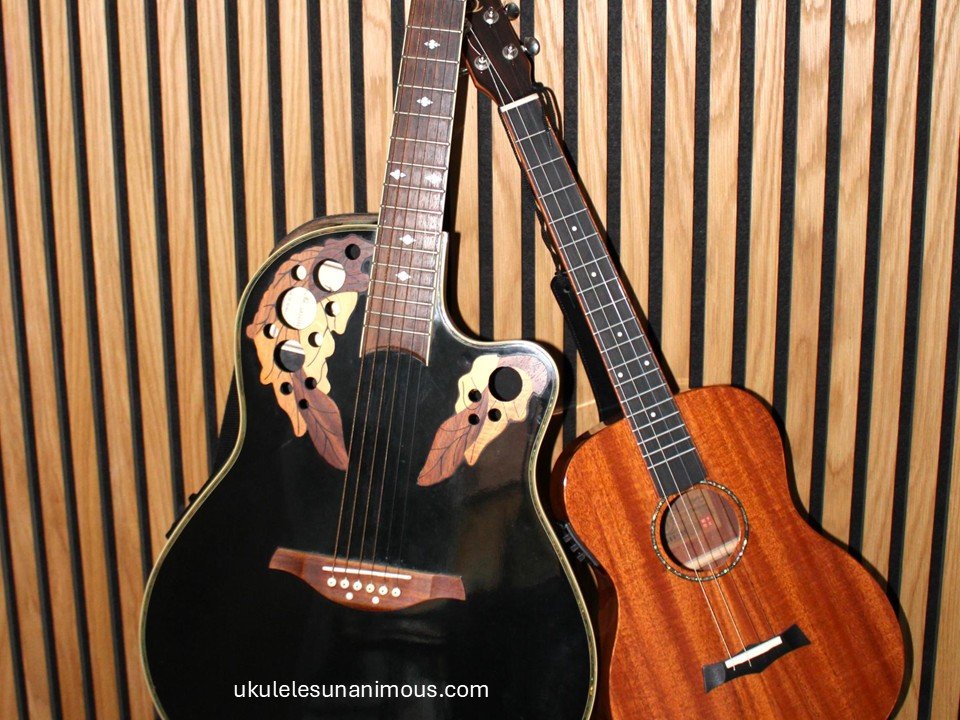IS GUITAR OR BARITONE UKULELE BETTER? Which is it to be?
Which Is Better Guitar or Baritone Uke?
The very fact that you are reading this means that you’ve probably stumbled across the baritone ukulele and the guitar. Both have their own unique charm, but how do they really stack up against each other? Let’s begin the ultimate showdown of baritone ukulele versus guitar and help you decide which one deserves top spot in your musical collection.
Meet the Contenders
The Baritone Ukulele: A Deep-Voiced Charmer
The baritone ukulele is the big sibling of the uke family. With its larger size and deeper tone, it’s tuned D-G-B-E (just like the top four strings of a guitar). That makes it a favorite for those who love a mellow, soulful sound. Plus, it’s easier to play than a full-sized guitar - perfect for beginners.
Key Features:
• Smaller and lighter than most guitars
• Nylon strings for a softer, finger-friendly feel
• Tuned like the highest four strings of a guitar
• Warm, rich tones that are perfect for ballads, jazz, and folk
The Guitar: The Rockstar of String Instruments
The guitar is the ultimate jack-of-all-trades. Available in acoustic, electric, and classical varieties, it’s a mainstay in everything from rock and blues to classical and country. Its six strings are tuned E-A-D-G-B-E, giving it a broader range and more versatility - but also a steeper learning curve.
Key Features:
• Larger and heavier than a baritone ukulele
• Steel or nylon strings, depending on the type
• Six strings for a wider range of notes
• Suited for just about every genre of music
Baritone Ukulele vs Guitar - Key Differences
Size and Portability
If you’re always on the go, the baritone ukulele is your best bet. It’s smaller and more portable than even a travel-sized guitar. Whether you’re strumming on the beach or at a campfire sing along, the baritone uke wins hands-down for convenience.
Winner - Baritone Ukulele
Playability
Baritone ukuleles are often considered easier to play, especially for beginners. With only four strings and a shorter fretboard, chord shapes are simpler and less intimidating. Guitars, on the other hand, require more finger dexterity and strength, especially for barre chords.
Winner - Baritone Ukulele
Sound and Versatility
When it comes to sheer versatility, the guitar takes the crown. Its wider range of notes and ability to handle complex chords make it suitable for nearly every genre. The baritone ukulele, while rich and warm, has a more niche sound that’s best for specific styles.
Winner - Guitar
Tuning and Transition
If you’re a guitarist looking to branch out, the baritone ukulele offers a smooth transition. Since it’s tuned like the top four strings of a guitar, you’ll feel right at home. For ukulele purists, though, the baritone’s tuning might feel a little too close to guitar territory.
Winner - It’s a tie!
Who Should Choose What?
Go for the Baritone Ukulele If:
• You’re a beginner looking for something simple and approachable.
• You love the ukulele but crave a deeper sound.
• Portability is a top priority.
Opt for the Guitar If:
• You want an instrument that can handle any genre or style.
• You’re ready to tackle a steeper learning curve.
• You love the full, rich sound of six strings.
The Final Verdict
At the end of the day, the choice between baritone ukulele and guitar comes down to your musical goals, style, and preferences. The baritone uke offers an inviting start into the world of strings with its warm tones and easy playability. Meanwhile, the guitar stands as a versatile powerhouse for those ready to rock.
So, which one will you pick? Whether you’re strumming a beautiful melody on a baritone ukulele or shredding a solo on a guitar, which is it to be?
Both? You decide - there’s no wrong choice, just music waiting to be made!
Let us know your thoughts in the comments below.
Happy Strumming 😊


